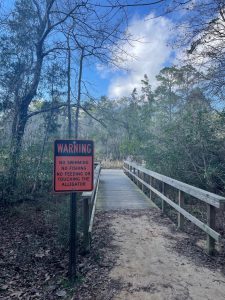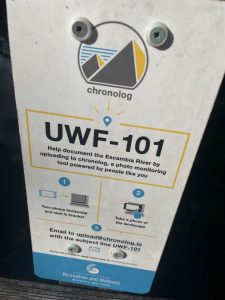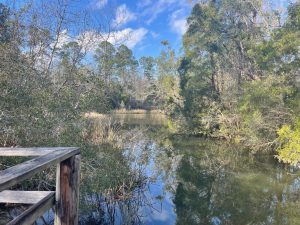
Like any Florida nature trail worth its salt, the approach to the Edward Ball Nature Trail on the University of West Florida (UWF) campus includes a sign asking visitors not to feed the alligators. UWF sits along Thompson Bayou, which flows into the gator-friendly Escambia River.
I went to graduate school at UWF—taking classes in the evenings after a full day of work—and navigating the sprawling campus confidently took me nearly a year. The biology and environmental sciences departments are on different sides of campus, so it takes a minute to traverse the hilly and winding school grounds.

While a little confusing on first approach, this geographical and topographical variety is one of the many things that makes UWF unique. Few campuses can offer legitimate off-road biking, hiking trails, and canoe/kayak launches just steps from academic classrooms, but all three of these exist on UWF’s 1,600 acre campus. Canoe rentals are available for students and alumni from the Health, Leisure, and Sports Center on campus.

The Edward Ball Nature Trail is located west of the Environmental Science building (13) and includes a pier, kayak launch, and a winding half mile boardwalk trail that crisscrosses through a hardwood swamp. Freshwater turtles sun themselves on logs in the bayou, birds and squirrels weave through the dense tree canopy, and geocachers hike past, searching for dozens of hidden treasures on campus. At several points along the boardwalk, you can exit and head off onto more than 20 miles of marked off-road biking trails. The trails are managed by the Pensacola Off Road Cyclists (PORC) and trail maps are available online.


On the bayou footbridge crossing, a recently added photo spot serves as part of a citizen science effort to monitor changes in the landscape over seasons and years. Using a program called “chronolog,” scientists are working with outdoor enthusiasts all over the United States (plus one in England!) to monitor wild places over time.
Access to the trail is free—if you don’t already have a campus parking sticker, you can pick up a visitor’s pass as you enter campus. Follow Campus Drive around to Parking Lot G, and walk behind buildings 13 (Environmental Science) or 10 (Crosby Hall) towards the woods. Within minutes, you’ll find yourself in a quiet, peaceful spot amidst a bustling college campus.
 6
6
